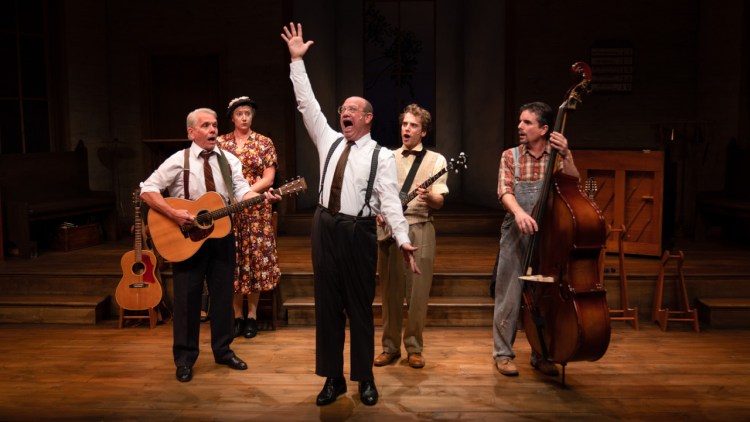With a songbook of bona fide bluegrass and gospel like “Angel Band,” “I’ll Fly Away,” and “Whispering Hope,” Smoke on the Mountain invites its audience to a concert-gone-slightly-awry in a small, Baptist church in 1930s North Carolina.
Actors John Vessels, Jr* (Pastor Oglethorpe), Sarah Hund* (June Sanders) and Andrew Crowe* (Stanley), who is also the music director for this production, have all performed in Smoke at least once before, with Vessels re-visiting his character for the sixth time. They joined a conversation about creating a lived-in performance with music and emotions that connect with all types of folks.
*Member, Actors’ Equity Association
MOLLY ADAMS: How would you describe this show to a friend who hasn’t seen it?
JOHN VESSELS, JR: Nunsense for Baptists. [Everyone laughs.] It’s a look into this culture of people through a loving but comical lens.
The track list reminds me of O Brother, Where Art Thou, and that was a huge hit. The music has Christian roots, but so many people connect to it.
VESSELS: Well, it’s a show about people! Character and conflict. The Sanders family has something they need to do and Pastor Oglethorpe has something he needs to do. They’re chaos for him and he’s chaos for them. I have atheist friends who love this show.
SARAH HUND: And it takes place in real time, so you’re seeing this real slice of the family performing and living at this church.
Are any of you from this type of background?
ANDREW CROWE: I was raised in a very religious family. My parents were missionaries, and we grew up some in Portugal. When we were back in the States, we would visit churches up and down the East Coast and we would get up and sing as a family and then my dad would preach.
HUND: Wow, that’s amazing. That’s really your life!
So, you really get this show.
CROWE: Yes, and I see how it’s potentially tricky to advertise a show that appears to be a church service.
But when I’ve done this show before, people will come up to me afterward saying, “The light of Jesus shines through you, thank you for your testimonies.” And literally the next goes, “Boy, you really skewered the Christians.” So, it’s not a preachy show—unless you want to feel it that way.
HUND: I have had the same post-show experience. Sometimes, people think we’re a real family.
Jon, what has brought you back to this show so many times?
VESSELS: Every character is deliciously flawed. There’s not one person that holds a higher virtue than anybody else. I’ve always been interested by people who want to give a testimony to save your soul, but they don’t see that they are vain or prideful or whatever their particular bugaboo is.
Andrew, what’s it like to also be the musical director for the show?
CROWE: It’s unique as far as music directing jobs are concerned. It is also a little intimidating, because of how strong of musicians the other cast members are. There’s as script and score, but nothing is locked in. Our job is to become a band the way a family would become a band. I guide us to cohesion.
How many instruments are played in the show?
HUND: If you count percussion, like triangles and everything, 30 or 40.
VESSELS: Piano, mandolin, banjo, two guitars, fiddle, bass, a trumpet shows up, an accordion too, autoharp…
HUND: Every production of this show you see could be different. I was in a show where the twin characters were fiddle players and they created duels. In our show, we have Daniel Emond, who is an incredible banjo player and my actual bandmate offstage.
So, you all play multiple instruments?
HUND: My character, June, does not play. The musician in me wants to jam and sing along, but June is a very rewarding character to play. I love her with all my heart, just her sweetness and who she is. She tries so hard to be a part of everything, and she has a wisdom to her as well. Her job is listening, and the world and the Sanders family needs that.
CROWE: June has something to say that is useful to political and cultural conversations we’re having right now. We often have strong, preconceived notions. But if we stop and listen, we run a lovely risk of softening our view and seeing someone else as being human, even if they do fall on a completely different end of something than we do, and maybe be ready to tread softer in the world.

Comments are not available on this story.
Send questions/comments to the editors.


